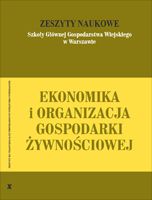Main Article Content
Article Details
HALCROW H. G., 1980: Economies of Agriculture. McGraw - Hill, New York.
JÓZWIAK W.,1998: Opłacalność produkcji rolniczej (W:) Encyklopedia agrobiznesu. Fundacja Innowacyjna, Warszawa.
KOWALSKI Z., 1992: Wybrane problemy definiowania i oceny efektywności gospodarowania w rolnictwie. ZER nr 1-3.
KOWALSKI Z., 1992: Kategorie efektywności produkcji (w świetle teorii funkcji produkcji). ZER nr 4.
KOWALSKI Z., 1993: Efektywność alokacji nakładów w rolnictwie (w świetle teorii funkcji produkcji). ZER nr 1-2.
KOWALSKI Z., 1996: Efekty skali a efektywność technologii i poziom zarządzania w rolnictwie rodzinnym. Wyd. AT-R, Bydgoszcz.
MANTEUFFEL R., 1979: Ekonomika i organizacja gospodarstwa rolniczego. PWRiL, Warszawa.
LANGE O., 1971: Ekonomia polityczna, Tom 1. PWN, Warszawa.
LANGE O., 1975: Dzieła, Tom 3. PWN, Warszawa.
PISKORZ W., 1990: Metody mierzenia względnej efektywności technicznej produkcji rolniczej. ZER nr 1/2.
WASILEWSKI M., 2007: Efektywność przedsiębiorstw rolniczych a poziom kapitału obrotowego. ZER nr 1. (Crossref)
ZIĘTARA W., 1998: Metodyczne aspekty oceny efektywności gospodarowania w rolnictwie. Zeszyty Naukowe SGGW, Ekonomika i Organizacja Gospodarki Żywnościowej, (34). (Crossref)
Downloads
- Sławomir Juszczyk, CREDIT ABILITY IN BANK ASSESMENT ON SMALL AND MIDLE ENTRERPRISES EXAMPLE , Zeszyty Naukowe SGGW - Ekonomika i Organizacja Gospodarki Żywnościowej: No. 66 (2008)
- Artur Nagórka, Sławomir Juszczyk, The umbrella funds and bank locations as the place for cash of companies , Zeszyty Naukowe SGGW - Ekonomika i Organizacja Gospodarki Żywnościowej: No. 77 (2009)
- Rafał Balina, Sławomir Juszczyk, Prediction of insolvency the shipping enterprises as a banking decision tool , Zeszyty Naukowe SGGW - Ekonomika i Organizacja Gospodarki Żywnościowej: No. 78 (2009)
- Sławomir Juszczyk, Artur Nagórka, The methodological problems with choosing research sample on the example of food processing enterprises , Zeszyty Naukowe SGGW - Ekonomika i Organizacja Gospodarki Żywnościowej: No. 75 (2009)
- Maria Tymińska, Sławomir Juszczyk, Optimization of transport organization in distribution system of company , Zeszyty Naukowe SGGW - Ekonomika i Organizacja Gospodarki Żywnościowej: No. 81 (2010)
- Sławomir Juszczyk, Artur Nagórka, Mezzanine fi nance as the type of fi nancing placed between the shares issue and the bank credit , Zeszyty Naukowe SGGW - Ekonomika i Organizacja Gospodarki Żywnościowej: No. 78 (2009)
- Sławomir Juszczyk, Martyna Jasionek, Credit sector of small and medium-sized enterprises in Poland , Zeszyty Naukowe SGGW - Ekonomika i Organizacja Gospodarki Żywnościowej: No. 89 (2011)
- Sławomir Juszczyk, Rafał Balina, Predicting the risk of bankruptcy of companies from road freight transport , Zeszyty Naukowe SGGW - Ekonomika i Organizacja Gospodarki Żywnościowej: No. 104 (2013)
- Sławomir Juszczyk, The Scale and the Profitability of Milk Production , Zeszyty Naukowe SGGW - Ekonomika i Organizacja Gospodarki Żywnościowej: No. 53 (2004)
- Sławomir Juszczyk, Paweł Snarski, Overview of potential taxes and fees imposed on banks in the face of the global economic crisis , Zeszyty Naukowe SGGW - Ekonomika i Organizacja Gospodarki Żywnościowej: No. 93 (2011)





